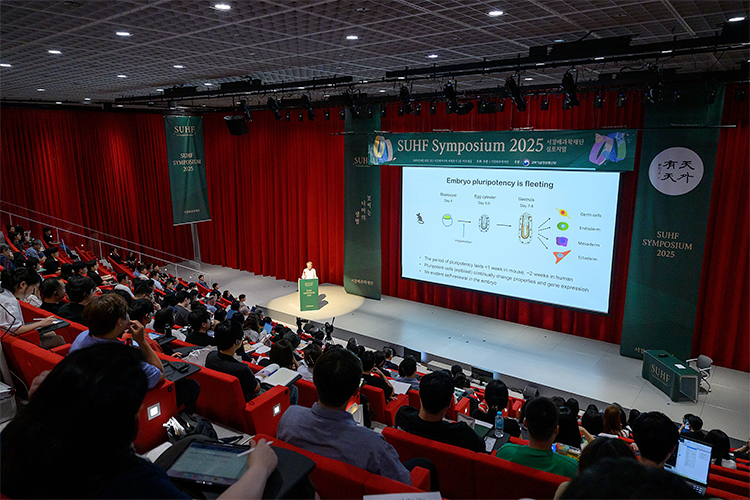
The Suh Kyungbae Foundation, under the leadership of Chairman Kyungbae Suh, convened the 'SUHF Symposium 2025' this past Saturday, August 30th, at the Amorepacific Headquarters in Yongsan District, Seoul.
This distinguished academic event, hosted by the foundation and sponsored by Korea's Ministry of Science and ICT, was held under the theme, 'Life Beyond the Visible.' It provided a singular platform for the Suh Kyungbae Foundation scientists selected in 2020 to present the culmination of their research endeavors over the past five to both their academic peers and a diverse public audience. The symposium drew approximately 400 attendees from a wide spectrum of fields, including life science researchers, high school students, educators, and corporate scientists.
The symposium was launched with a keynote address by Professor Austin Smith of the University of Exeter in the United Kingdom, a world-renowned authority in embryonic stem cell research. Following the address, the program unfolded with a 'graduation' panel discussion featuring three researchers, presentations of scientific achievements, and a variety of events, including a poster session.
▲Professor Won-Ki Cho of the Department of Biological Sciences at KAIST presented 'A Journey into the Cell Using Light,' unveiling novel cellular phenomena discovered through the use of super-resolution microscopy. He provided a vivid depiction of the cell's interior, previously obscured from view with conventional microscopes, elucidating the mechanisms of transcription within the cell nucleus and the influence of the nuclear membrane on gene expression.
▲Professor Joo-Hyeon Lee of the Sloan Kettering Institute presented her research under the title, 'Regeneration and Disease Mechanisms Through the Reorganization of Stem Cells and Basal Cells Following Lung Injury.' She illuminated how the intricate interplay between pulmonary stem cells and their surrounding environment dictates the course of damage repair or disease progression. Utilizing 'organoids'—miniature organs cultivated in the laboratory—she masterfully illustrated the diverse behaviors of alveolar type 2 (AT2) cells, the stem cells of the alveoli.
▲Professor Soung-Hun Roh of the School of Biological Sciences at Seoul National University introduced his research, 'The Growth and Socialization of Proteins: How Do Proteins in Our Bodies Cooperate?' He detailed the use of Cryo-Electron Microscopy (Cryo-EM), a cutting-edge technique that captures the atomic structure of proteins by flash-freezing them to temperatures below -180 degrees Celsius. Through this lens, he explained the precise process of protein folding and the sophisticated system through which multiple proteins interact to maintain cellular homeostasis.
The 'SUHF Symposium,' inaugurated in 2020, serves as a sort of 'graduation ceremony' where scientists from the Suh Kyungbae Foundation publicly present the fruits of five years of dedicated research. It is a venue not only for showcasing the latest knowledge and advancements in life science, but also for sharing the insights cultivated through the foundation's support of scientific research with society at large, through real-time engagement with audience questions. The event has firmly established itself as a vibrant forum for communication, connecting researchers with a broad and intellectually curious public.
Chairman Kyungbae Suh remarked, "I believe that science represents the most formidable key to unlocking the future, and life science, in particular, plays a decisive role in advancing human life, health, and societal progress." He affirmed the foundation's commitment, stating, "For the past nine years, the Suh Kyungbae Foundation has supported emerging scientists with an unwavering faith in nurturing life itself. We will continue to advance together, toward a better world created by science."
